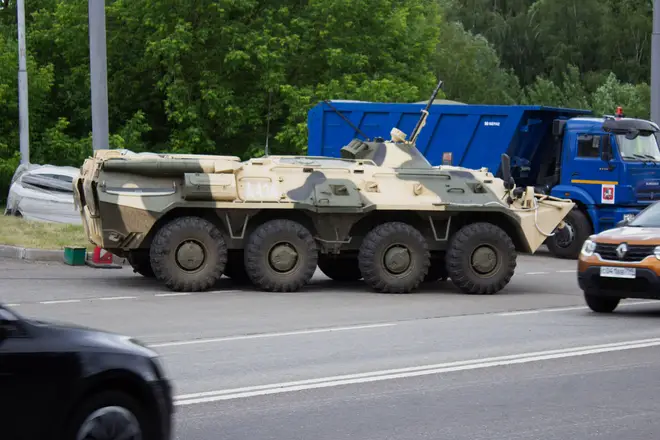
Daniel Barnett 9pm - 10pm
25 June 2023, 12:52 | Updated: 25 June 2023, 13:41

Vladimir Putin faces a "deeply unstable" aftermath after striking a deal with Wagner boss Yevgeny Prigozhin in the wake of his rebellion.
The Russian leader faced his worst nightmare on Saturday as armed fighters launched a revolt against his presidency after the mercenaries said they had been attacked in Ukraine by the regular military.
But Prigozhin agreed to go into effective exile in Belarus after the dictator there, Alexander Lukashenko, mediated a deal, the full conditions of which are not clear, and his fighters stopped their march on Moscow.
The insurrection was effectively quashed but experts believe the rebellion will leave a lasting impact that has destabilised Russia.
Read more: Kremlin denies Putin has fled Moscow as rebel Wagner tanks and 5,000 soldiers move to capital
The fact Putin was forced to first plead for the fighters to stop, then come to an agreement that gave Prigozhin a way out and promised rebel fighters will not be punished, may erode his image in the minds of his people.
Moscow looked vulnerable given the rapid advance of Wagner and the sheer amount of men and equipment tied up in Ukraine that is needed to try and defend against Kyiv's counter attacks.

Experts at the Institute for the Study of War (ISW) think tank in the US said: "The Kremlin now faces a deeply unstable equilibrium. The Lukashenko-negotiated deal is a short-term fix, not a long-term solution, and Prigozhin's rebellion exposed severe weaknesses in the Kremlin and Russian MoD.
"Suggestions that Prigozhin's rebellion, the Kremlin's response, and Lukashenko's mediation were all staged by the Kremlin are absurd.
"The imagery of Putin appearing on national television to call for the end of an armed rebellion and warning of a repeat of the 1917 revolution – and then requiring mediation from a foreign leader to resolve the rebellion – will have a lasting impact.
"The rebellion exposed the weakness of the Russian security forces and demonstrated Putin's inability to use his forces in a timely manner to repel an internal threat and further eroded his monopoly on force.

"Prigozhin's rapid drive towards Moscow ridiculed much of the Russian regular forces – and highlighted to any and all security figures, state-owned enterprises, and other key figures in the Russian government that private military forces separate from the central state can achieve impressive results.
"Wagner's drive also showcased the degradation of Russia's military reserves, which are almost entirely committed to fighting in Ukraine, as well as the dangers of reliance on inexperienced conscripts to defend Russia's borders."
Prigozhin claimed a Wagner camp near Bakhmut had been attacked by the Russian military after months of him criticising the leadership.
He then marched his mercenaries over the border, apparently facing no resistance from young conscripts, then rolled into Rostov in the south of Russia and appeared to take over a regional HQ.
His other fighters attacked facilities in Voronezh, just 300 miles from Moscow.
He said it was a "march for justice" and that he had 25,000 men willing to die.

But by the end of Saturday, after talks with Lukashenko, he said he would leave for Belarus. Some Wagner fighters are expected to be rolled into the Russian military.
The Kremlin had to insist Putin did not flee Moscow after social media users said they were tracking planes that could have been used to evacuate government officials to St Petersburg.
The full terms of the deal Prigozhin agreed are unclear. It was speculated over whether the futures of defence minister Sergei Shoigu and the head of the Russian armed forces, Valery Gerasimov, will be up in the air given Prigozhin's criticism of them.
The ISW said it is not forecasting an imminent collapse of the Russian government but it noted how residents in Rostov greeted Wagner in some cases, which it said was not necessarily in direct opposition to Putin but did show acceptance of Prigozhin's actions.